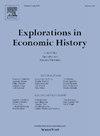Local energy access and industry specialization: Evidence from World War II emergency pipelines
IF 1.7
1区 历史学
Q1 ECONOMICS
引用次数: 0
Abstract
How does improving access to the supply of energy affect regional specialization in manufacturing? We evaluate the long-run employment impacts of pipelines constructed by the U.S. government during World War II to transport oil and gas from the oil fields of the Southwest to wartime industrial producers in the Northeast. The pipelines were built rapidly to connect end points along a direct path that minimized use of scarce construction materials. Postwar they were converted to supply en route customers, giving counties close to the pipelines access to a cheap and plentiful source of energy. Between 1940 and 1950, counties with better access to pipeline gas had larger increases in their share of employment in energy-intensive industries. These impacts persisted to the mid-1980s for all energy-intensive industries and to the late 1990s for the subset of industries intensive in the direct use of electricity, despite the disruptive effects of the 1970s energy crisis. Our findings are relevant for understanding energy-related path dependence in local economic development patterns and how government intervention in energy markets affects industry location in the short and long run.
地方能源获取和行业专业化:来自二战应急管道的证据
能源供应的改善如何影响制造业的区域专业化?我们评估了美国政府在第二次世界大战期间建造的管道对就业的长期影响,这些管道将石油和天然气从西南部的油田输送到东北部的战时工业生产者。管道的建造速度很快,沿着一条直接的路径连接端点,最大限度地减少了稀缺建筑材料的使用。战后,它们被转换为供应途中客户,使靠近管道的国家获得廉价而丰富的能源。在1940年至1950年间,管道天然气供应较好的县,其能源密集型产业的就业份额增长幅度较大。这些影响对所有能源密集型工业一直持续到1980年代中期,对直接使用电力的工业子集一直持续到1990年代后期,尽管1970年代能源危机造成了破坏性影响。我们的研究结果有助于理解地方经济发展模式中与能源相关的路径依赖,以及政府对能源市场的干预在短期和长期内如何影响产业区位。
本文章由计算机程序翻译,如有差异,请以英文原文为准。
求助全文
约1分钟内获得全文
求助全文
来源期刊

Explorations in Economic History
Multiple-
CiteScore
2.50
自引率
8.70%
发文量
27
期刊介绍:
Explorations in Economic History provides broad coverage of the application of economic analysis to historical episodes. The journal has a tradition of innovative applications of theory and quantitative techniques, and it explores all aspects of economic change, all historical periods, all geographical locations, and all political and social systems. The journal includes papers by economists, economic historians, demographers, geographers, and sociologists. Explorations in Economic History is the only journal where you will find "Essays in Exploration." This unique department alerts economic historians to the potential in a new area of research, surveying the recent literature and then identifying the most promising issues to pursue.
 求助内容:
求助内容: 应助结果提醒方式:
应助结果提醒方式:


